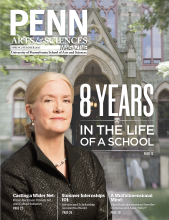Ask Jere Behrman about the best investment a developing country can make, and he’ll show you a healthy infant.
Behrman, a development economist who is the William R. Kenan, Jr. Professor of Economics, is an expert on human resources and household behaviors in developing nations. Many of his major recent research studies have centered on the critical issue of early life nutrition, and his investigations have conclusively linked low nutrition in infants to decreased capabilities later in life, such as poor school performance and reduced wages.
“It is increasingly evident that what happens in early life has long-term consequences,” said Behrman, who has consulted with the World Bank, foreign governments and international aid organizations. “It is difficult to ameliorate deprivation later in childhood. It usually is more cost-effective to do that as soon as possible.”
A research associate at Penn’s Population Studies Center, Behrman stands at the crossroads of economics and sociology. His deep knowledge of what he terms “human resources”—meaning the essential resources needed to build a thriving society, such as education, nutrition, and health—has informed the public policy directives of developing countries in Asia, Africa, and Latin America. He has authored scores of publications, including books, monographs, and academic articles.
In addition to conducting major studies on the long-term ramifications of early-life nutrition, Behrman has analyzed other human resource matters critical to poor countries, such as disease and education. The issues he tackles are complex—and the stakes are high. With scant funds in poorer nations such as Ethiopia, Jamaica, Zambia, Chile, and Guatemala—all of which Behrman visited in 2012—governments must allocate monies strategically to provide their populations with the basic resources all human beings need to thrive.
Behrman’s expertise is sought after across the globe, including in the United States, where he serves as the economics and social science member of the National Institutes of Health’s National Institute of Child Health and Development National Advisory Council.
Although he stresses the importance of life’s earliest years, Behrman has also researched education in later childhood and adolescence. He recently collaborated with two other Economics faculty at Penn, Alfred L. Cass Term Professor Petra Todd and Walter H. and Leonore C. Annenberg Professor in the Social Sciences and Department Chair Kenneith I. Wolpin, and with Susan Parker of the research and academic center CIDE in Mexico, to design and evaluate the efficacy of a strategy tested by the Mexican Ministry of Education to award financial incentives to students and educators in order to raise math scores. Studying three variations of incentive programs in 88 Mexican high schools with over 40,000 students, they found that incentivizing math performance was most effective when students, teachers, and school administrators were all recipients of financial rewards based on the students’ level and improvement in performance on curriculum-based mathematics examinations.
Behrman conducts the majority of his research in developing nations, but his findings hold important implications for affluent societies, as well. In his influential paper with former Penn economics professor Mark Rosenzweig (now at Yale) on “Returns to Birth Weight,” they found that improved nutrition within the womb in the United States, controlling for all family and genetic background characteristics, causes increased schooling and earnings but not obesity or greater birth weights in the next generation.
Recently, Behrman’s work has centered on a series of National Institute of Child Health and Development, Bill and Melinda Gates Foundation, and Grand Challenges Canada projects for which he is the principal investigator, and which are studying the economic returns to mitigating early life risks—including malnutrition, infectious diseases, inadequate stimulation, and poor maternal care—throughout the developing world. Over 50 investigators in 17 countries are contributing.
“A child deprived of adequate human resources in early life almost always is missing a full life,” says Behrman. “Our aim is to understand the long-range consequences of that deprivation and protect every country’s most precious resource, its human capital.”




